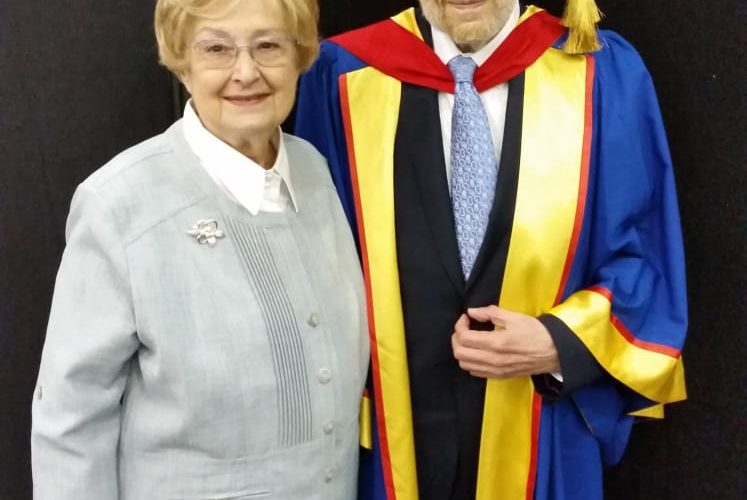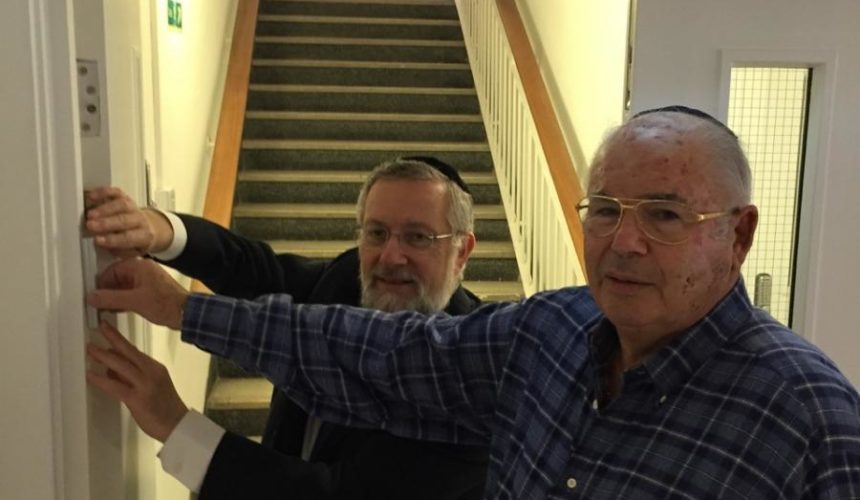Irving Carter together with Dayan Binstock putting up the mezuzah to the Carter Club, February 2016 Our Dad was born on 20 April 1944, he was a wonderful father, husband, grandfather and cousin and a friend to all who knew him. Our Dad has touched so many people in so many different ways, he was larger than life, hardworking, humble, understated and a great philanthropist for many causes. We would like to express our gratitude and heartfelt thanks to everyone, the Rabbonim and friends from our community both here and abroad. We have taken great comfort in all your words...
Gerald Goodhardt 05.04.30 – 07.05.20

Professor Gerald Goodhardt and Mrs Valerie Goodhardt on the occasion of receiving an honorary doctorate, University of South Australia, 2015. When Prof Goodhardt was being buried in London, it was already Shabbat in Australia. Rabbi Ian Goodhardt recorded the following message which was played at the funeral. I have spoken, as a rabbi, at many funerals. I hope you will permit me, on this occasion, to leave the rabbinic duties in the capable hands of Dayan Binstock, and speak to you simply as a grieving son. At the centre of my father was a core of goodness. And even though...
Annette Viner-Melnic 07.10.28 – 30.04.20

Annette’s daughter, Tamara, lives in Kansas, and delivered the following tribute via zoom at the funeral, Bushey New Cemetery. A year and a half ago we were celebrating Mum’s 90th birthday surrounded by wonderful family and friends. And what made it truly special was that both her grandsons Benjamin and Marc were there to celebrate with her. I made a speech then, which I feel is still appropriate for today. Some of you may already have heard this at the funeral on Friday. However, since Friday I have received the most wonderful condolences from around the world as to how...
Behar Bechukotai

VISIBLE AND INVISIBLE BARRIERS The first of the two sidrot for this Shabbat, discusses the sale of houses and how this is impacted by the Jubilee year and whether the house in located in a walled city. In the course of this presentation, there is an unusual feature in the Sefer Torah. It is what we call, a keri uketiv. The phrase is written in one way, and read, another way. Except that, in this case, it sounds exactly the same! The oral version is heard identically to the written version. The only difference would be in the intention on...
Fay Laub 02.04.27 – 14.04.20

Tribute delivered by her daughter, Ellen Bolsom, at the funeral, Bushey Old Cemetery My beautiful, beloved Ma, Gary’s beautiful beloved Ma, Margs, Grandma, Auntie Fay … We all adored her and will miss her so very much. May she rest peacefully. How special and brilliant she was; she made the world a much better place. She touched the lives of all of us and so many others by the virtue of her character, her courage, her modesty and undaunting generosity. For those who knew her … ‘No words are necessary.’ For those who did not know her … ‘No words...
Emor

THREE KINDS OF HOLINESS This week’s parasha deals with the three different types of holiness we find in Judaism: holiness of the person, holiness in time, and holiness in space. The first two portions of the sidra outline the special responsibilities on the Cohen. Whom may he marry? Under what circumstances may he go to the cemetery? What are additional responsibilities upon the Cohen Gadol, the High Priest? What could disqualify him from serving as a Priest? The holiness of the person is explored in this section. Much of the central section of the parasha will be familiar as the...






